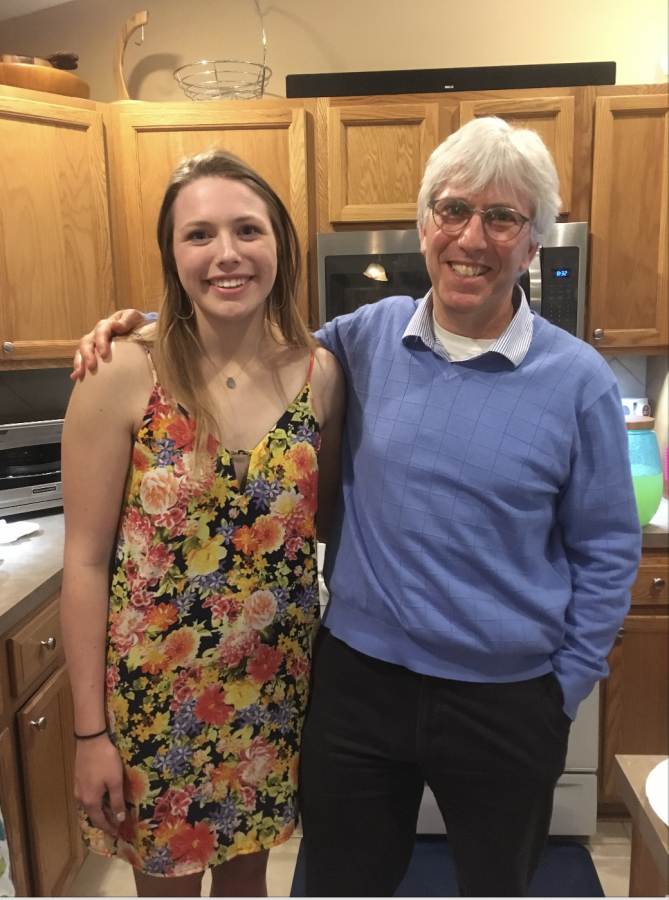Alumna spurs international discussion following harassment from Michigan senator
Jan 20, 2020
Grand Valley State University alumna Allison Donahue, a reporter for the Michigan Advance, hustled to interview Michigan Sen. Peter Lucido when he responded with a comment that would leave her speechless. Surrounded by male students from his high school alma mater, De La Salle Collegiate, Lucido said that the boys could “have a lot of fun” with her.
But what is making international headlines is Donahue’s response to the senator, both by defending herself in-person and her following column for the Advance titled, “I tried to interview Sen. Peter Lucido. He told me a group of schoolboys ‘could have a lot of fun’ with me,” which holds Lucido accountable for his actions. Since its release, Donahue and her self-advocacy has made its way to publications like the BBC, BuzzFeed News, the Detroit Free Press and more.
Following the release of the piece, Donahue took to Twitter to share her thoughts where she explained that she was proud to have been able to stand up for herself when she returned to Lucido, which is something she wouldn’t have done in the past.
“I didn’t want to stand up for myself after that,” Donahue tweeted. “It’s awkward and in rare cases is it ever taken well and the comments apologized for. But I’ve stayed silent before.”
To be honest, if this was another time in my life, I probably would have let it slide. I’m not proud of that at all.
But I knew that I had an opportunity to make some kind of change for women who don’t have the support like I had in that moment.
— Allison R. Donahue (@donahual) January 15, 2020
In an interview with the Lanthorn, Donahue said she expected her piece to gain some traction around Lansing, but the attention it gained from the international community was surprising. The views on her piece and subsequent coverage by other media outlets has created a conversation that has become very personal to Donahue.
“The emotions change every minute. I’m thankful for the support I’ve received, I’m saddened by the amount of people who have resonated with it though… This doesn’t go viral because it’s absurd. It goes viral because it’s common and that is a really hard thing to take in, but it also shows the strength and solidarity that is resonating across the world.”
With that, Donahue said her story provided her with a wave of support from reporters, readers and peers alike. The pleasantly surprising side of this was that these messages didn’t just come from female reporters, but from all sorts of people in every field.
“I am surprised by how different (support) has looked in every way,” Donahue said. “I’ve gotten so many female reporters who have reached out and said, ‘Thank you. I’ve experienced the same thing. This has given me courage to speak up next time.’ But I’ve also gotten it from male reporters. I’ve gotten it from women in every field who have dealt with something like this. I’ve gotten it from men down in Tennessee who have 12-year-old daughters who it’s resonated for them.”
One person who also thanked Donahue personally was Michigan Gov. Gretchen Whitmer, who spoke publicly on Jan. 17 about supporting Donahue.
“That just shows that it’s not just the ‘new, early-in-her-career reporter that’s covering Senate sessions,’ but it’s the governor that gets comments like this,” Donahue said. “She received it when she was a senator. It has no limitations as long as toxic masculinity is in every form of power structure that we have. It’s not just in the government, but it’s everywhere.”
Report: Whitmer calls Donahue ‘incredibly brave’ for coming forward with story on Sen. Lucido https://t.co/ujZ7qteweG via @michiganadvance
— Michigan Advance (@MichiganAdvance) January 17, 2020
Two key players in supporting Donahue prior to publishing the piece were her editor, Susan Demas, and GVSU journalism professor Jeff Kelly Lowenstein. Donahue noted that Demas reminded her that she could refrain from publishing the piece right up to deadline, and Kelly Lowenstein provided wisdom and helped her in deciding whether to write it at all.
Kelly Lowenstein worked with Donahue to talk through the positives and negatives on the situation, with Donahue having early fears that this would brand her career in a bad light. While that ended up not being the case, Donahue said her conversation with her old professor helped her see the positive side of this shined light on an abuse of power that had to be addressed.
“Ever since the first class that I had with him, I knew that he was going to be someone I would look up to for the rest of my career, someone that was going to help me get this job and work through ethical issues,” Donahue said. “So when I was packing up and leaving the office on Tuesday night… I sent him a quick text and said, ‘Hey, I need some advice from you…’ He was a huge supporter and really walked me through the decision-making process.”
























